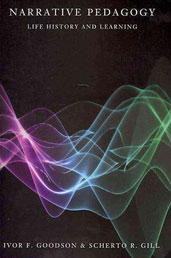Narrative Pedagogy
Learning and Narrative Pedagogy
1. The potential of narrative learning for consolidation and transformation
So far, we have established that as a fundamental form of human meaning-making, narratives can be significant sites for individual’s learning. In this way, a person’s sense of self is embedded in the narrative construction. To be a person is not only to be connected to their narrative, but more importantly, it is to be connected to how that person lives their life in relation to that narrative.
Implicit in this argument is a definition of learning which goes beyond the conventional perception of learning as the acquisition of knowledge and skills. Our vision for learning encompasses meaning-making, connecting to what is valuable and worthwhile in what humans do, being and becoming. Indeed, this vision can be so difficult to pin down that many theorists tend to define it under the broad theme of identity development. Thus for some, the narrative project becomes an identity project.
We, however, would rather approach this from a slightly different angle and stress our conception of learning which is centred round the notion of human development. We don’t want to call it an identity project per se. For us, learning concerns the flourishing of individual human beings and the realisation of their fullest capacities. Thomson (1987, 2002) argues that the nature of human life must be taken into consideration in order to define ‘flourishing’, and that a flourishing life must involve appreciating activities that are non-instrumentally valuable (i.e. not a means to an end). Gill & Thomson (2009) further maintain that learning involves the cultivation or strengthening of the personal qualities that are necessary for a flourishing life. These qualities or virtues are more than traditionally conceived knowledge or skills because they involve caring in appropriate ways. They are qualities or virtues that a person should foster independently. These qualities are also to be defined by the general contours of flourishing and by its specific human content appropriate to each person. These qualities are not those required by the ‘shoulds’ of social morality but rather by the ‘it would better if’ of personal ethics.
